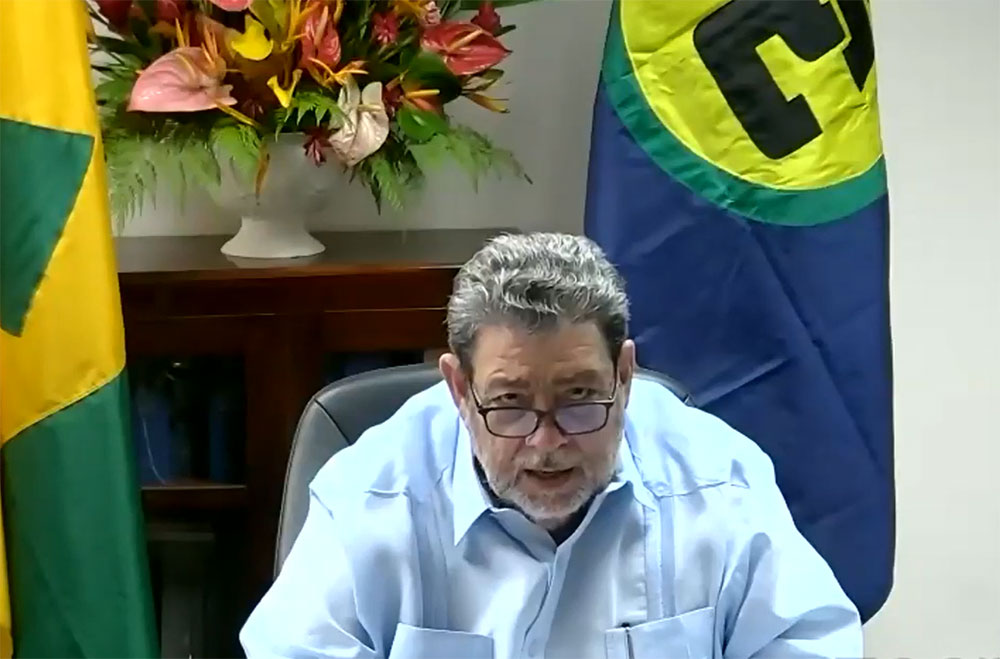THE 186th ANNIVERSARY OF THE ABOLITION OF SLAVERY IN THE CARICOM MEMBER-COUNTRIES WHICH WERE COLONISED BY BRITAIN
BY DR. THE HONOURABLE RALPH E. GONSALVES PRIME MINISTER OF ST. VINCENT AND THE GRENADINES AND CHAIRMAN OF THE CARIBBEAN COMMUNITY (CARICOM)
On August 1, 2020, the Caribbean Community (CARICOM) commemorates the l86th anniversary of the abolition of the enslavement of Africans in the CARICOM member-countries which were colonized by Britain. In 1833, in the British Parliament, an Act for the Abolition of Slavery in the British Empire’ proclaimed Emancipation Day to be August 1, 1834. A so-called “apprenticeship” period followed; and on August 1, 1838, the enslaved Africans were, fnally, legally freed.
Today, all but two of the fourteen member-countries of CARICOM commemorate and celebrate Emancipation Day on August 1st, annually. So, too, the Associate member-countries. The other two member-countries of CARICOM, Haiti and Suriname, had slavery abolished in 1801 and 1863 respectively. The overwhelming majority of the population of CARICOM member-countries are of African descent. Joyously, people of all ethnicities in CARICOM join in commemorating and celebrating Emancipation Day; all rightfully claim this historic day as their own.
This year, Emancipation Day takes on a greater international significance for the following reasons:
The Black Lives Matter (BLM.) Movement has gone global in a massive way consequent upon the popular resistance in the United States of America to racism, racial inequality, racial injustice and oppression and the uplifting fight for liberty, justice, and equality in every material respect.
The world is half-way through the International Decade for People of African Descent (2015 — 2024), which was proclaimed by the United Nations General Assembly in a Resolution (68/237), adopted on December 23, 2013; and focused on the theme ‘People of African Descent: Recognition, Justice, and Development.”
The gathering pace of the international movement for “Reparations for Native Genocide and the Enslavement of Africans” in the Caribbean, Africa, Latin America, Europe and North America, to provide appropriate recompense for the legacy of under-development consequent upon native genocide and enslavement of Africans perpetrated by several states in Europe and in North America.
The joinder of the struggle for reparations with the quest for the Sustainable Development Goals (SDGs), adopted by the United Nations General Assembly in September 2015, and designed as a “blueprint to achieve a better and more sustainable future for all” by 2030.
The current pandemic of COVID-19 which has adversely affected, disproportionately, poor communities and countries, especially those already ravaged by developmental inequities and distortions, traced substantially to the legacy of under-development to native genocide and the enslavement of Africans.
THE FOCUS OF REPARATIONS ON EMANCIPTATION DAY, 2020
I urge all in CARICOM to focus on reparations for the enslavement of Africans on Emancipation Day, 2020. In our region, and elsewhere, we need to have a more thorough-going public education programme on the meaning and significance of reparatory justice for the Caribbean. Further, our governments must ramp up the political, diplomatic, and international legal struggle for reparations. All hands are required on deck as a matter of urgency!
CARICOM has established a Prime Ministerial Sub-Committee on Reparatory Justice headed by the Prime Minister of Barbados. (I am also on this Prime Ministerial Sub- Committee). CARICOM has set up, too, a CARICOM Reparations Commission, chaired by Sir Hilary Beckles, Vice Chancellor of the University of the West Indies. The Commission has advanced a 10-point CARlCOM Reparations Agenda which has been adopted by the CARICOM Heads of Government Conference. In each country, a National Reparations Commission has been established with broad-based representation.
Solid ground work has been done thus far, but we must not lose any momentum or be side-tracked. The circumstances are now propitious for escalating a coordinated push for reparatory justice. And CARICOM must engage the African Union fully on this.
Recently, several CARICOM member-states have been strengthening their links with Africa in profound ways; so, too, CARICOM and the African Union. Much more is required to be done, and urgently, too. At the United Nations Security Council, a new institutional linkage of much consequence has been forged known as the A3 Plus One (the African 3: Niger, South Africa, and Tunisia, Plus St. Vincent and the Grenadines) ; this represents a collaboration between the regions of continental Africa and a representative country (St. Vincent and the Grenadines) of the sixth region of the African Union, namely the African diaspora.
A high quality of abundant research has been done and published, on Reparations for Native Genocide and the Enslavement of Africans. More is still required to be done, but there is more than enough for us to proceed upon in our many-sided struggle. So, let us highlight reparatory justice on Emancipation Day, 2020, even as the individual countries in CARICOM engage in commemorative and celebratory activities of a cultural, social, political, and religious nature.
SUMMATION
I end with an apt poem by Ellsworth “Shake” Keane of St. Vincent and the Grenadines (1927-1997), entitled “Private Prayer (for Walter Rodney)”, and written in April 1973, on the occasion of the publication of Walter’s How Europe Under-developed Africa:
“To understand
How the whole thing run
I have to ask my parents
And even my daughter and son
“To understand the form
Of compromise I am
I must in my own voice ask
How the whole thing run
“To ask
Why I don’t dream
In the same language I live in
I must rise up
Among syllables of my parents
In the land which I am
And form
A whole daughter a whole son
Out of the compromise
Which I am
“To understand history
I have to come home”
Please remember, too, on Emancipation Day, 2020, that June 13, 2020, was the 40th anniversary of Walter Rodney’s assignation. No one has yet been brough to court for the killing of Walter. The next government of Guyana must address this matter fully; it is a gaping wound in our collective consciousness which must be healed.





